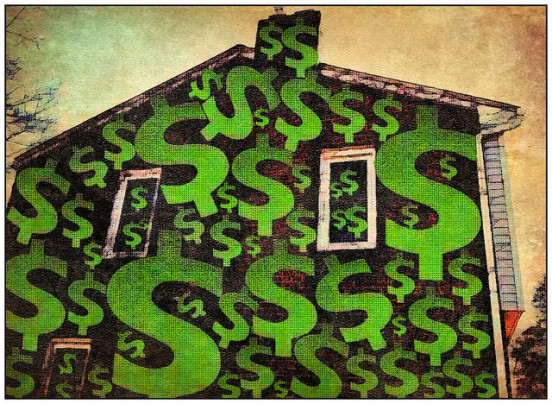One of the main arguments in favor of buying a home is equity. When you rent, you’re sending your monthly payment to a landlord. As a buyer, your monthly mortgage payment is helping to build equity. Of course, many homeowners wait and then, following the sale of their house, use their accumulated equity to help buy their next home. But you can also use a home equity loan to access the value your home has accrued. So what do homeowners who take home equity loans do with the money? Well, a recent survey asked borrowers and came up with an answer. Not surprisingly, the top reason homeowners took out loans was to fund home improvement or remodeling projects. This is a common strategy since taking out a loan to improve your house means you may be able to recoup some of the cost if, and when, you sell the home. Other common answers included money to invest in another property, emergency expenses, retirement funds, and debt consolidation. More here.
Archive for June 2018
Builders Confident But Concerned About Costs
These days, the health of the housing market is a matter of inventory. Right now, there are fewer houses available for sale than is typical and, because of it, prices are rising and sales aren’t as high as they might be otherwise. However, as more new homes are built, buyers will have begin to see more choices and prices will start to moderate. In short, whether or not you find a great house in your price range may have something to do with how many new homes are being built. Because of this, the National Association of Home Builders takes a monthly survey of builders to help gauge how confident they are in the market. In June, builder confidence slipped two points from the month before, though it is still at 68 on a scale where any number above 50 indicates more builders feel good about conditions than poor. Randy Noel, NAHB chairman, says builders are optimistic about the number of interested home buyers but are concerned about the rising cost of materials. “Builders are optimistic about housing market conditions as consumer demand continues to grow,” Noel said. “However, builders are increasingly concerned that tariffs placed on Canadian lumber and other imported products are hurting housing affordability.” More here.
Buyer Demand High Despite Rising Prices
Home prices have been on the rise for a while now. But, in most cases, the jump in values was really just prices recovering the losses suffered following the financial crisis. After the housing crash, prices plummeted and, in the years following, they have rebounded. Now some markets have fully recovered and some are even surpassing previous peaks. But despite this climb in prices, and recent mortgage rate increases, home buyers have not been deterred. In fact, a recent outlook from Freddie Mac says that sales should increase this year and again in 2019. “Buyer resiliency in the face of higher rates reflects the healthy economy and strong consumer confidence,” the report reads. But, though high demand is driven, in part, by a stronger economy and job market, it also reflects the fact that, though conditions have changed, in many markets home price and mortgage rate increases haven’t pushed past the point of affordability. More here.
Where Are The Nation’s Fastest Growing Luxury Markets?
When shopping for a house to buy, it’s hard not to fantasize about homes that are out of your price range. Regardless of what you plan to spend, it’s fun to imagine buying a house even bigger, nicer, and more feature filled than the ones within your reach. And, with the Internet, it’s easier than ever to steal a glance inside the nicest homes in the area. In fact, you can shop real estate in any area. But, while we’re all familiar with famous luxury markets such as Beverly Hills or Aspen, Colo., what are the nation’s lesser-known, up-and-coming luxury markets? Well, according to a new index from the National Association of Realtors’ consumer website, East Coast house hunters looking for a warm weather getaway have propelled Sarasota and Collier counties in Florida to two of the top five spots on the list of fastest growing luxury markets. Other areas that made the list include counties containing Castle Rock, Colo., San Jose, Calif., Queens N.Y., Seattle, Jersey City, and Redwood City, Calif. But, if you’re planning a move to one of these hot spots, you have to move fast as they all have seen 10 to 20 percent price increases over the past year. More here.
Mortgage Rate Rise Doesn’t Deter First Time Buyers
According to the Mortgage Bankers Association’s Weekly Applications Survey, average mortgage rates were up last week across all loan categories, including 30-year fixed-rate loans with both conforming and jumbo balances, loans backed by the Federal Housing Administration, and 15-year fixed-rate loans. The increase comes after a brief period of decreases driven by concerns about the global economy. Joel Kan, an MBA economist, told CNBC those concerns remain. “Despite lingering uncertainty over a potential trade war, investors moved away from Treasurys, pushing yields up for the week,” Kan said. “Overall mortgage application activity declined as rates rose, but government applications increased, driven largely by increases in FHA applications, reflecting stronger demand by first-time home buyers.” The increase in government loans could be an encouraging sign that younger buyers are returning to the market, after several years where first-time buyers were less active than historically normal. The MBA’s weekly survey has been conducted since 1990 and covers 75 percent of all retail residential mortgage applications. More here.
Credit Standards And What They Mean To You
There are many factors that play a role in determining whether you’re able to qualify for a mortgage. Credit standards are one of them. But unlike your income or debts, they aren’t as easy to keep up with. They are important, though, so here’s what you need to know. Credit standards refer to the requirements lenders use to determine whether or not you qualify for a loan. When credit standards are tight – as they were following the financial crisis and housing crash – potential buyers have to reach a higher financial standard in order to be deemed creditworthy. When they loosen, the opposite is true and buyers will have an easier time obtaining a mortgage. Because of the role they play in determining whether buyers are approved or not, Fannie Mae’s Lender Sentiment Survey takes the pulse of lenders across the country to determine whether standards have been loosening or tightening lately. Generally speaking, standards have eased since the financial crisis. The survey’s most recent results, though, show little movement from the previous quarter. More here.
Cautious Buyers May Be Overestimating Costs
Affordability is the top concern for potential home buyers entering the summer season. That’s not a surprise. With prices and mortgage rates up, it’s natural that Americans who are hoping to buy might be leery when seeing news of rising housing costs. But, though affordability conditions are challenging in some markets, buyers may have some misconceptions that are adding unnecessary stress and anxiety. For example, according to the results of one recent survey, potential home buyers see saving for a down payment as the biggest obstacle preventing them from buying a house. But, at the same time, they overestimate the amount of money they’ll need to put down in order to buy. The survey found 58 percent of participants said they are planning for a 20 percent down payment. But though that may be the recommended down payment amount, it isn’t required. The National Association of Realtors, for example, found that the median down payment for first-time buyers has been at 6 percent for the past three years. In other words, though home buyers are right to take seriously the costs and responsibilities of becoming a homeowner, they may want to explore all of their options before deciding they can’t afford to buy. More here.







